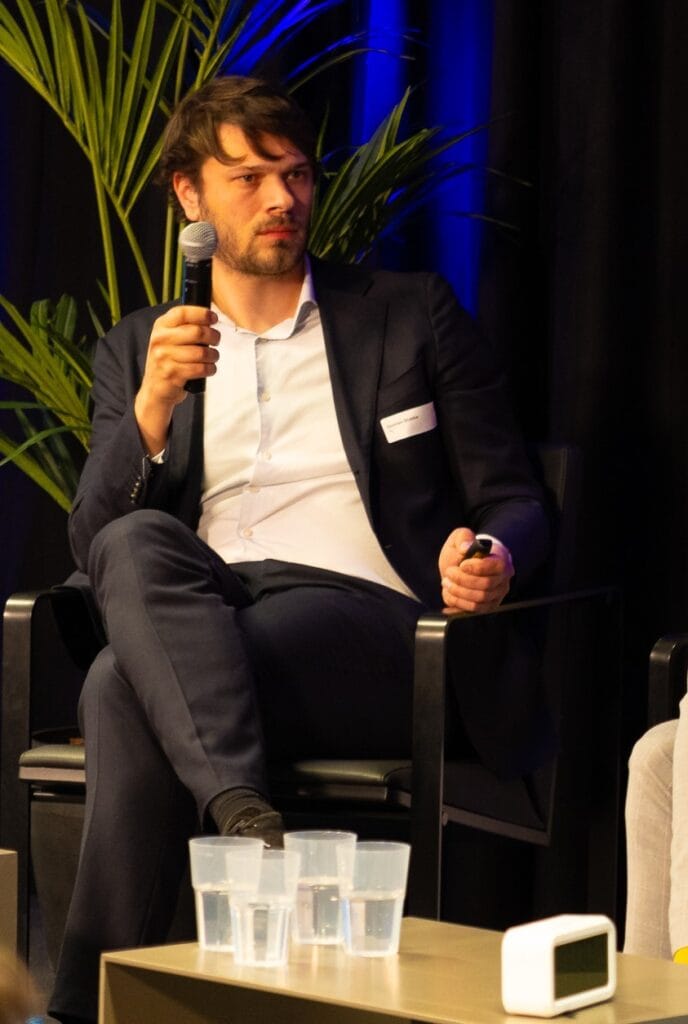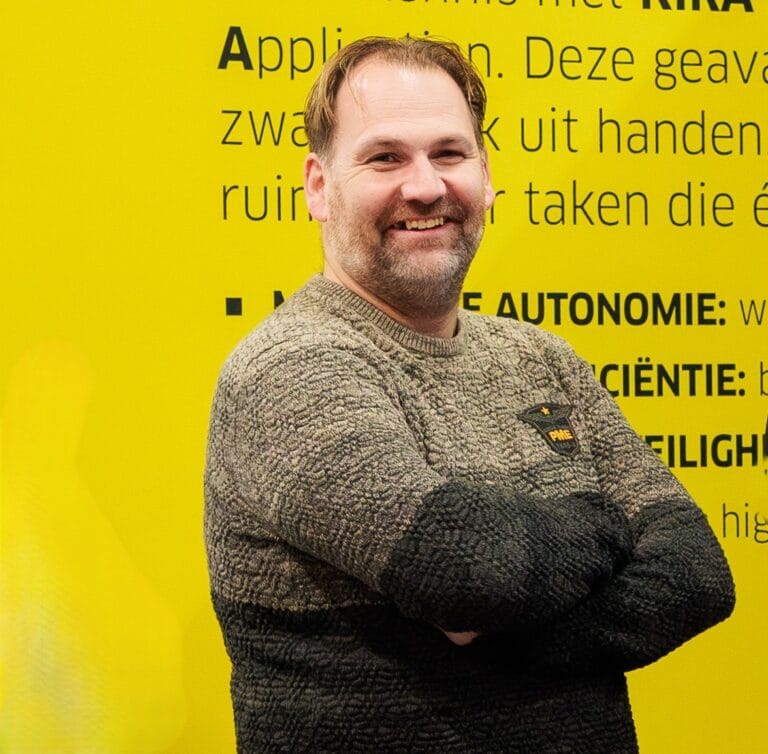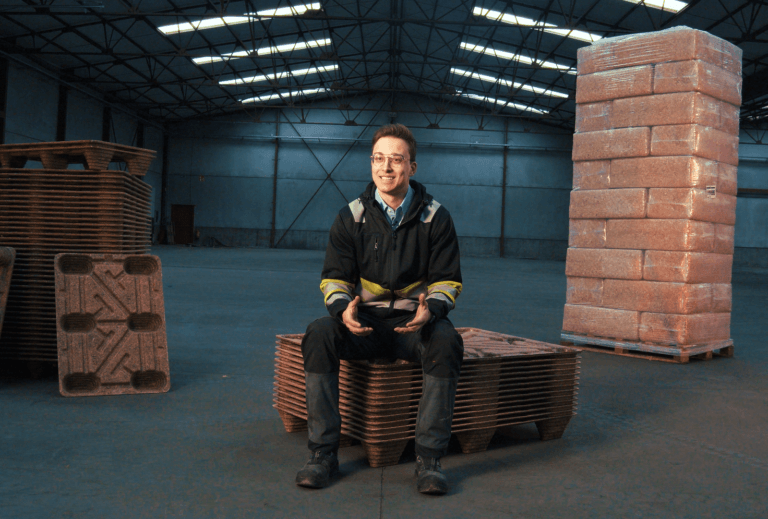Interactive experience CILO emphasises opportunities circular logistics

In its drive to make the economy more sustainable, the European government is adopting rules that encourage the manufacturing industry to keep their products and materials in circulation for as long as possible. The key words are reuse, repair and remanufacturing. In the circular economy, logistics plays a crucial role. To make companies aware of the possibilities of circular logistics, LogiVille will open an immersive and interactive experience space in september named CILO. VIL project leader Domien Stubbe is already giving a look-in.
“The concept of the circular economy was born not only from the realisation that products, their components and materials should remain in circulation as long as possible for the sake of sustainability, but also from the observation that there is a shortage of resources and materials,” says Stubbe. “We need to burden the earth less, while trade crises and incidents such as the blockage of the Suez Canal have painfully shown us how much we depend on resources extracted outside of Europe.”
The European Union has therefore significantly tightened its regulations to boost the circular economy, especially in sectors that consume a lot of resources or generate a lot of waste. Those new rules are part of the EU Circular Economy Action Plan, a key building block of the European Green Deal. “Key sectors in which adjustments are taking place are packaging and plastics – think of the Packaging and Packaging Waste Regulation (PPWR), which is already receiving attention in LogiVille – electronics and ICT, batteries and vehicles, textiles and clothing, construction or the food industry,” said the project leader.
Circular logistics plays a central role in extending the lifespan of goods and minimising waste and resource consumption. This means that logistics processes focus not only on delivering new products to customers, but also on efficiently collecting, sorting, reusing, repairing and recycling used products and materials.
Reusing building materials
“A good example is the construction industry. Recent years have clearly shown that building materials have become scarce and expensive. Reuse can partly offset this. After all, demolition releases many materials: (bricks), beams, planks, tiles and you name it. Reuse projects have therefore initiated in several Flemish cities,” he adds.
Leuven, for instance, is a pioneer in this field. Since 2021, the Materialenbank Leuven has been offering second-hand building materials, saving hundreds of tonnes of construction timber, sheet material and facade timber from the waste pile every year. There is also a similar initiative in Brussels, Rotor DC. This focuses on collecting, sorting and selling recovered materials such as washbasins, tiles and lighting. Builtwise in Antwerp is also part of this effort: it is a knowledge centre for the construction sector that researches sustainable building methods, including the reuse of materials.
“However, reusing building materials, electronics, clothes and other goods requires a lot of time, manpower and knowledge in terms of transportation, sorting, storage, reuse, refurbishing and so on. It is also very expensive. So a lot of innovation is needed to optimise flows and reduce costs. So this is where new, circular logistics play a very important role,” Stubbe adds.
Innovative solutions
Unlike traditional logistics, which is mainly linear (from production to consumption to waste), circular logistics has a closed loop. Traditional logistics systems focus mainly on speed, cost control and just-in-time delivery, with waste disposal often the end point. Circular logistics, on the other hand, requires a broader view, with return logistics, dismantling, refurbishing and reintegrating materials into the production chain being essential. This requires more complex and dynamic planning and distribution systems. “Circular logistics therefore offers many opportunities in terms of innovation,” he explains.
“This requires a fundamentally different approach to logistics processes, with sustainability and circularity as core principles. This requires innovative solutions,” he adds.
Flanders among leading innovators

Is Flanders pioneering circular logistics? According to Stubbe, the answer depends on perspective. “We are doing quite well. Flanders shows a lot of policy ambition: the coalition agreement, for instance, gives attention – and even priority – to circularity initiatives, but it still lacks clear objectives. On the other hand, through Flanders Circular, Flanders is positioning itself as a hub of circular innovation, with working agendas for various sectors. We also notice that many companies are actively working on it.”
In fact, the fact that CILO’s opening ceremony at LogiVille on 4 September was sold out almost immediately indicates a strong industry interest in circular logistics. “Logistics companies are aware of the many ‘business opportunities’ and want to be ready for this new logistics when it finds wider acceptance,” he said. The presence of Flemish prime minister Matthias Diependaele at the opening ceremony also shows that the government wants to play a stimulating role,” Stubbe said.
A ‘wow’ experience
The new CILO experience room at LogiVille is an interactive space where 20 to 25 visitors at a time will be immersed in the world of circular logistics for around 20 minutes. It will be a ‘wow’ experience: thanks to screens all around and impressive sound, it is not only a place for sensation and awareness, but also for inspiration. Visitors can help drive the choices they have to make”.
CILO will be a permanent part of LogiVille, where different sectors can be covered. “We are starting with clothing because many people are already aware of the adverse effects of ‘fast fashion’ and can therefore more easily see the opportunities of a more circular logistics,” Stubbe explains.
CILO is an absolute first: it will be the first immersive space around circular logistics in Europe and even worldwide. To give the topic even more attention, the opening is accompanied by the launch of a new Theme Tour ‘Circular Supply Chains – more than closing the loop’. So this Theme Tour – including CILO – is highly recommended.
Want to experience it yourself? Book your visit to the new Theme Tour now.



